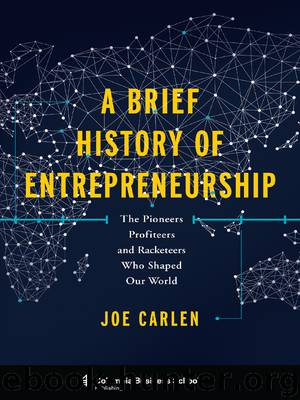A Brief History of Entrepreneurship by Carlen Joe;

Author:Carlen, Joe;
Language: eng
Format: epub
Tags: BUS025000, Business & Economics/Entrepreneurship, BUS023000, Business & Economics/Economic History
Publisher: Columbia University Press
Published: 2016-10-10T16:00:00+00:00
A Seafaring Entrepreneur from Genoa
The Portuguese bounty from its maritime adventures aroused great interest throughout Mediterranean Europe, including the Italian city-state of Genoa. The seafaring merchants of that city were known to be quite skilled at maritime trade. (In fact, it was Genoese merchants returning from the Black Sea who unknowingly carried the Black Death contagion to their hometown, leading to outbreaks that claimed roughly 30 percent of Europe’s population during the fourteenth century.) During the late fifteenth century, one Genoese merchant in particular, born Cristoforo Colombo, surpassed the impact of any preceding explorer. Columbus’s all-consuming desire for wealth and recognition personified a new generation of European explorer-entrepreneurs and the many thousands of settlers and pioneers who would follow in his wake.
Meanwhile, in Spain, Queen Isabella and King Ferdinand were busy crushing the few remaining Muslim, or “Moorish,” strongholds. Finally, in 1492, Granada fell to the Christian army. With the Reconquista now complete, the Spanish royal couple turned their attention to other matters. Alarmed by their Iberian neighbor’s expansion of trade routes and the steadily growing number of overseas territories flying the Portuguese flag, the Spanish king and queen were eager to claim their “fair share” of overseas treasures. Isabella, in particular, was willing to back these ambitions with a financial investment, albeit a limited one.
By this time, the forty-one-year-old Christopher Columbus had more than twenty years of commercial sailing and charting experience. During the first fifteen years of his maritime career, he had accompanied Genoese merchants on expeditions throughout Mediterranean Europe and North Africa, sailed north to Ireland and Iceland with Portugal’s “merchant marine” (the country’s nonmilitary commercial fleet), and procured sugar from Madeira on behalf of Genoese traders. By the mid-1480s, Columbus operated as an independent seafaring entrepreneur, trading in gold and other wares obtained in West Africa. However, despite attaining a measure of the wealth he craved, Columbus was growing restless.
With Portuguese explorers reaching farther and farther down the African coast, the discovery of an eastward maritime route to India was imminent. Columbus was more interested in the pursuit of a new westward route to east Asia across the Atlantic, which would allow him to establish a trade monopoly. Although Columbus was not the first person to conceive of such a route, he was the first to attempt it. The Genoese sailor lacked the means to realize such a grand vision, so he turned to the Portuguese Crown. Not only did the king and queen possess the requisite means, they had already declared themselves in favor of such expeditions.
Considerable funds would be needed for the vessels, sailors, and provisions that such a bold undertaking would necessitate. “Just like any modern-day entrepreneur with a brilliant idea,” the biographer Emma Carlson Berne observed, “Columbus needed someone to invest money in his idea in return for a share of the profits.”3 The Crown was asked to supply three fully staffed and stocked caravels (the caravel being the forerunner of the galleon ship). Moreover, for his efforts, Columbus requested 10 percent
Download
This site does not store any files on its server. We only index and link to content provided by other sites. Please contact the content providers to delete copyright contents if any and email us, we'll remove relevant links or contents immediately.
| Consulting | Entrepreneurship |
| Franchises | Home Based |
| Marketing | New Business Enterprises |
| Nonprofit Organizations & Charities |
Pioneering Portfolio Management by David F. Swensen(5599)
Zero to One by Peter Thiel(4817)
Man-made Catastrophes and Risk Information Concealment by Dmitry Chernov & Didier Sornette(4728)
The Motivation Myth by Jeff Haden(4521)
The Miracle Morning by Hal Elrod(3903)
Elon Musk by Ashlee Vance(3449)
The Art of Persistence: Stop Quitting, Ignore Shiny Objects and Climb Your Way to Success by Michal Stawicki(3365)
Unlabel: Selling You Without Selling Out by Marc Ecko(2975)
Urban Outlaw by Magnus Walker(2946)
Delivering Happiness by Tony Hsieh(2918)
Purple Cow by Seth Godin(2694)
Mastering Bitcoin: Programming the Open Blockchain by Andreas M. Antonopoulos(2504)
The Content Trap by Bharat Anand(2488)
The Marketing Plan Handbook: Develop Big-Picture Marketing Plans for Pennies on the Dollar by Robert W. Bly(2408)
The Power of Broke by Daymond John(2373)
The Airbnb Story by Leigh Gallagher(2363)
Applied Empathy by Michael Ventura(2323)
Radical Candor by Kim Scott(2210)
The Startup Way by Eric Ries(2154)
